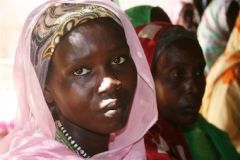Darfur peacekeepers should enhance civilian protection capabilities
August 22, 2007 (NEW YORK) — International peacekeepers in Darfur should provide civilian protection and use rapid-response capabilities to protect women from widespread rape and other sexual violence, Human Rights Watch said today.
 A report from the UN Office of the High Commissioner for Human Rights (OHCHR) on August 21 described how government forces and affiliated armed groups in December 2006 captured and systematically raped dozens of women during a large attack in South Darfur. The report is just the latest evidence of widespread sexual violence in Darfur, which has also been documented by Human Rights Watch and others.
A report from the UN Office of the High Commissioner for Human Rights (OHCHR) on August 21 described how government forces and affiliated armed groups in December 2006 captured and systematically raped dozens of women during a large attack in South Darfur. The report is just the latest evidence of widespread sexual violence in Darfur, which has also been documented by Human Rights Watch and others.
“The mounting evidence of widespread rape in Darfur underscores why the newly approved AU-UN mission will need to be prepared to protect civilians,” said Peter Takirambudde, Africa director at Human Rights Watch. “Peacekeepers in Darfur need the capacity to respond rapidly to threats against civilians.”
Women in Darfur are also at risk of sexual violence outside the context of large attacks. Women risk being raped if they leave their camp for internally displaced people to search for firewood. In some areas, the current African Union Mission in Sudan (AMIS) has provided “firewood patrols” to accompany groups of women once or twice a week as they gather firewood. But these patrols have often been ineffective due to poor organization, lack of resources, and lack of communication with the people who benefit from the patrols.
If such patrols were better organized and carried out, they could make a major contribution to the protection of civilians, as could the appointment and wide dispersal of more human rights monitors on the ground.
Human Rights Watch welcomed the recent agreement on a proposed AU-UN hybrid force for Darfur. However, that force will not be on the ground until next year.
“Civilians under attack today can’t wait for the hybrid force,” said Takirambudde. “Better patrols to protect women and more human rights monitors are needed now.”
In 2005, the UN Security Council referred the situation in Darfur to the International Criminal Court (ICC). When serious sexual violence forms part of a widespread or systematic attack against civilians, it can constitute a crime against humanity. In the case of Darfur, such crimes could be prosecuted under the jurisdiction of the ICC.
(HRW)
